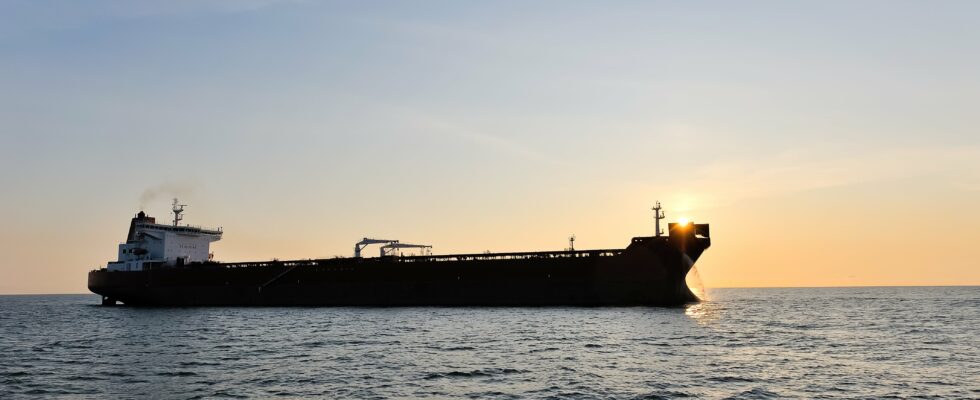It is a complex problem for Europe that is constantly growing. Russia is increasingly using “ghost ships” to transport its oil in defiance of European sanctions. Now, according to an article in Financial Times published Monday July 22it also uses ships to transport its liquefied natural gas. But what exactly are we talking about?
These are old tankers bought by the Russian authorities, whose ownership is unclear, and which sail in secret to transport Russian oil across the world’s waters. They sometimes fly the flags of small countries, such as Gabon or Panama, and allow to circumvent the sanctions on the transport of Russian hydrocarbons put in place by the G7 and the European Union at the beginning of the war in Ukraine. Indeed, the transport of Russian oil is prohibited by these sanctions if it is sold at more than $60 per barrel. Usually, more than two-thirds of this transport is carried out by Western shipping companies, but they respect the sanctions and no longer do business with the Russian oil industry.
Therefore, Russia is using this ploy to sell its goods at a higher price, as are Iran and Venezuela, oil-producing countries also under embargo, explains Elisabeth Braw, analyst at the Atlantic Council think tankRussia sells its black gold to China, India, Turkey and Brazil, who then resell it at even higher prices to other nations.
Vessels without insurance
This “ghost fleet” does not comply with the P&I insurance system, the protection and indemnity insurance, which is used by shipping companies to pool risks. Between 90 and 95% of the P&I insurance market is controlled by European or British insurers, who are also implementing sanctions against Moscow. Without adequate insurance or provided by Russia with its own insurance services, these ships today transport 1.7 million barrels per day, or no less than 70% of Russian oil, according to the Kyiv School of Economics (KSE)and prevent Vladimir Putin’s regime from losing the windfall that this trade represents, which finances the war in Ukraine.
This practice is not new and shows the difficulty of applying certain sanctions against Moscow. “A cold war is raging at sea. For the West, the situation is perilous: applying sanctions against a small rogue state is one thing; preventing one of the world’s leading oil producers from selling its goods is more complicated,” Paul Tourret, director of the Nantes-Saint-Nazaire Higher Institute of Maritime Economics, analyzed to L’Express in February 2023.
But European countries are determined to fight this clandestine fleet, as they stated at the meeting of the European Political Community on July 18. “Together with our European partners, we have sent a clear message to those who allow Putin to escape sanctions: we will not allow Russia’s ghost fleet and the dirty money it generates to circulate freely in European waters and endanger our security,” British Prime Minister Keir Starmer hammered home on the sidelines of this meeting. The project is colossal: there are around 1,400 old Russian ghost ships in circulation according to the Atlantic Counciland ships over 20 years old are expected to reach 11% of the global tanker fleet by 2025, compared to 3% before the war in Ukraine, according to the same think tank.
Risk of oil spill
The clandestine fleet also presents significant dangers, both in terms of security and the environment. To avoid being detected, oil tankers deactivate their GPS, which allows them to be identified remotely, and thus increase the risk of collision with other vessels. Not to mention that three quarters of these vessels are over 15 years old, are in poor condition and are not frequently inspected. Accidents, such as fires, engine failures, loss of rudders or even oil spills, which are catastrophic for the environment, are therefore numerous. In October 2023, an oil tanker over 26 years old, flying the Cameroonian flag but part of the Russian “ghost fleet”, was found adrift in the Indian Ocean, near Indonesia. Its last inspection took place in 2017.
Northern European countries are concerned about the risk of oil spills, particularly in the Baltic Sea, where Russian oil tankers often sail. The German newspaper Frankfurter Allgemeine Zeitung reports that “the Finnish government and the country’s border guards recently asked the European Maritime Safety Agency to better prepare for a possible oil spill in the Baltic Sea caused by the ‘ghost fleet'”. On the one hand, to avoid irreversible damage to this ecosystem, and on the other hand to weaken Vladimir Putin.
